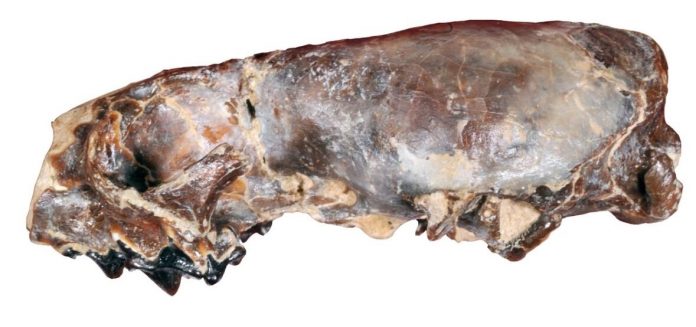A tiny skull mistakenly attributed to an ancient feline has been re-identified as belonging to an ancestor to modern weasels, wolverines, minks, and otters.
Introducing Corumictis wolsani, the earliest known mustelid in North America, according to research published in Zoological Journal of the Linnean Society. Mustelids are a diverse family of carnivorous animals including weasels, badgers, ferrets, wolverines, and similar creatures. Now extinct, C. wolsani lived around 26 million years ago in what is now Oregon.
“It has these incredibly sharp teeth, sharper than some weasels today,” Ryan Paterson, a paleontologist from Carleton University in Ottawa and the lead author of the new study, told CBC News. “It was probably a ferocious little thing, despite being the size of the tiniest weasel on the planet.”
Indeed, you shouldn’t let the small size of this animal fool you. Despite a skull measuring just 4 centimeters (1.56 inches) long, C. wolsani was likely an adept killer, feasting on smaller land mammals like ground squirrels, gophers, and rabbits, according to the new research. And in fact, their diminutive size may have allowed them to “slither into rodent holes,” as the authors wrote.
The skull was found during the 2000s in the John Day Formation of northern Oregon, which dates to between 28.8 million and 25.9 million years ago. Its discovery confirms the presence of mustelids during the Early and Late Oligocene in North America, and it’s around a million years older than other mustelids found on the continent. The oldest known mustelids come from Europe and lived around 2 million years prior to C. wolsani.
When it was first discovered, the specimen was initially identified as an ancient cat and promptly put on display at a museum in Oregon, according to the CBC. The skull was re-analyzed by Paterson, who was on the hunt for an intermediary species linking modern seals and sea lions to their extinct terrestrial ancestors, reports the CBC. C. wolsani wasn’t the missing link Paterson was looking for, but it was a fascinating and important discovery nonetheless.
Distinguishing characteristics, like the unique shape of its brain and inner ear, allowed Paterson and his colleagues to identify the species as new to science. C. wolsani is thought to be related to modern North American wolverines, minks, otters, and weasels. As noted in the CBC article, the researchers consider it to be the “great-grandfather of wolverines.”
As for the name, Corumictis means “northwest” in Latin, and wolsani is a nod to Polish paleontologist Mieczysław Wolsan, “who has extensively studied fossil musteloids and worked to reveal their evolutionary history,” as the authors wrote in the paper.
It’s not uncommon for artifacts to be misidentified at first. In 2018, an ancient Egyptian mummy of a “hawk” turned out to be stillborn human baby, for example.





























